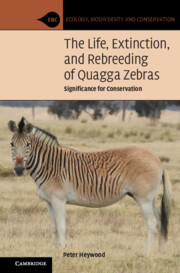Book contents
- The Life, Extinction, and Rebreeding of Quagga Zebras
- Ecology, Biodiversity and Conservation
- The Life, Extinction, and Rebreeding of Quagga Zebras
- Copyright page
- Dedication
- Contents
- Acknowledgments
- Introduction
- 1 Zebras
- 2 Quaggas
- 3 Coat Coloration
- 4 Quaggas, Zebras, and Humans in Southern Africa
- 5 Quaggas Abroad
- 6 Extinction
- 7 Afterlife
- 8 Rebreeding
- 9 Identity and Conservation
- Book part
- Notes
- Bibliography
- Index
Introduction
Published online by Cambridge University Press: 30 April 2022
- The Life, Extinction, and Rebreeding of Quagga Zebras
- Ecology, Biodiversity and Conservation
- The Life, Extinction, and Rebreeding of Quagga Zebras
- Copyright page
- Dedication
- Contents
- Acknowledgments
- Introduction
- 1 Zebras
- 2 Quaggas
- 3 Coat Coloration
- 4 Quaggas, Zebras, and Humans in Southern Africa
- 5 Quaggas Abroad
- 6 Extinction
- 7 Afterlife
- 8 Rebreeding
- 9 Identity and Conservation
- Book part
- Notes
- Bibliography
- Index
Summary
Quaggas, Equus quagga quagga, were plains zebras in southern Africathat ranged from east of Cape Town to the Orange Free State. They had fewer stripes on their bodies and a browner coloration than other zebras; their legs and bellies lacked stripes. The indigenous Khoe-San hunted quaggas and incorporated them into their art and folklore. Settlers used quaggas to pull wagons and kept them with livestock as protection against predators. In Europe, quaggas were admired, exhibited, and used to pull carriages. One quagga mated with a horse attracted commentary from Charles Darwin as the experiment seemed to confirm a theory of inheritance. Excessive hunting in their native habitats and the absence of captive breeding led to quaggas’ extinction in the late nineteenth century. Since 1987, the Quagga Project in South Africa has been selectively breeding plains zebras to produce animals with quagga coat coloration; however, could the funds expended have been better spent on conservation of endangered organisms and their habitats? Cape mountain zebras and bonteboks narrowly escaped extinction; how they were saved is discussed, along with other examples of conservation in South Africa.
- Type
- Chapter
- Information
- The Life, Extinction, and Rebreeding of Quagga ZebrasSignificance for Conservation, pp. 1 - 6Publisher: Cambridge University PressPrint publication year: 2022



